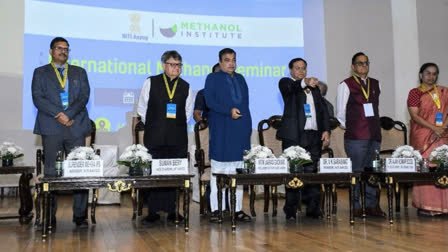New Delhi: New Delhi hosted the Second International Methanol Seminar and Expo, an event organized by NITI Aayog in collaboration with the Methanol Institute, USA on October 17-18, 2024. Building on the success of the inaugural seminar in 2016, this event aimed to promote a robust methanol economy in India, highlighting methanol's potential
Talking exclusively to ETV Bharat, Surender Mehra, Advisor at NITI Aayog, emphasised the critical role of methanol as a sustainable fuel across multiple sectors.
India’s journey toward achieving net-zero emissions by 2070 is distinct from that of developed nations, Surender Mehra, Advisor at NITI Aayog said. (ETV Bharat) "Methanol is not only an alternative fuel but a green fuel," he said. He outlined the various applications of methanol, ranging from shipping and transport to sustainable aviation fuel, cooking, and as a feedstock for various industrial processes.
India’s journey toward achieving net-zero emissions by 2070 is distinct from that of developed nations, Mehra explained. While developed countries have already reached peak industrialisation, India must simultaneously develop its industrial capabilities while reducing carbon emissions.
"Methanol and other alternative fuels will be instrumental in this journey," he stated, highlighting the need for a multifaceted approach that incorporates various renewable energy sources.
The Growing Methanol Economy in India:Prashanth Guru Srinivas, an organising member of the seminar, reiterated the potential of methanol to completely substitute diesel, petrol, and LPG. He shared insights on the advancements made since NITI Aayog launched the methanol program in 2016. Partnerships with industry leaders have led to the development of technologies for methanol blends, such as MD 15 (methanol-diesel blend) and M15 (methanol-petrol blend). Notable companies, including Kirloskar and Ashok Leyland, have produced methanol gensets and buses.
Prashanth Guru Srinivas, an organising member of Second International Methanol Seminar and Expo, Delhi, in an interview with ETV Bharat's Surabhi Gupta. (ETV Bharat) The Centre has already established a regulatory framework for methanol as a transport fuel, with the Ministry of Road Transport declaring it viable in 2018. "Methanol economy is now in its implementation phase," Srinivas stated, pointing to the launch of methanol-blended buses and trucks in November 2023 by Union Minister Nitin Gadkari.
Future Prospects and Policy Initiatives:As India positions itself as the third-largest user of methanol globally, the seminar showcased the importance of establishing a robust methanol infrastructure. Plans are underway for the rollout of methanol fuel stations, similar to existing ethanol stations, enabling easier access to this sustainable fuel. This would facilitate methanol's use in various applications, particularly in urban public transport, where rising diesel prices are causing financial strain.
Industry leaders echoed these sentiments. Mohit Mandan from Metfuel highlighted the launch of India’s first methanol dispensing vehicle, aimed at delivering methanol to large kitchens and reducing emissions significantly. He noted that methanol has no nitrogen oxides (NOx), sulfur oxides (SOx), or particulate matter, making it an ideal choice for urban settings struggling with air pollution.
Global Collaboration and Knowledge Sharing:A significant feature of the seminar was its emphasis on global collaboration, bringing together experts, industry leaders, policymakers, and researchers from around the world. The partnership with the Methanol Institute as a knowledge partner underscored the importance of shared expertise in promoting methanol initiatives.
As the event unfolded, discussions revolved around advancements in methanol production, including converting high ash coal into methanol and developing engines capable of running on 100% methanol. The Centre's investment in R&D projects aims to create a comprehensive framework for integrating methanol into the energy landscape.
Key Takeaways from the Seminar:Mehra concluded with an optimistic outlook: “The methanol economy is not just a vision; it is becoming a reality, and with the collective efforts of the government, industry, and academia, India can lead the way in sustainable energy solutions.”
